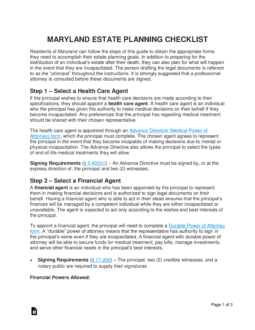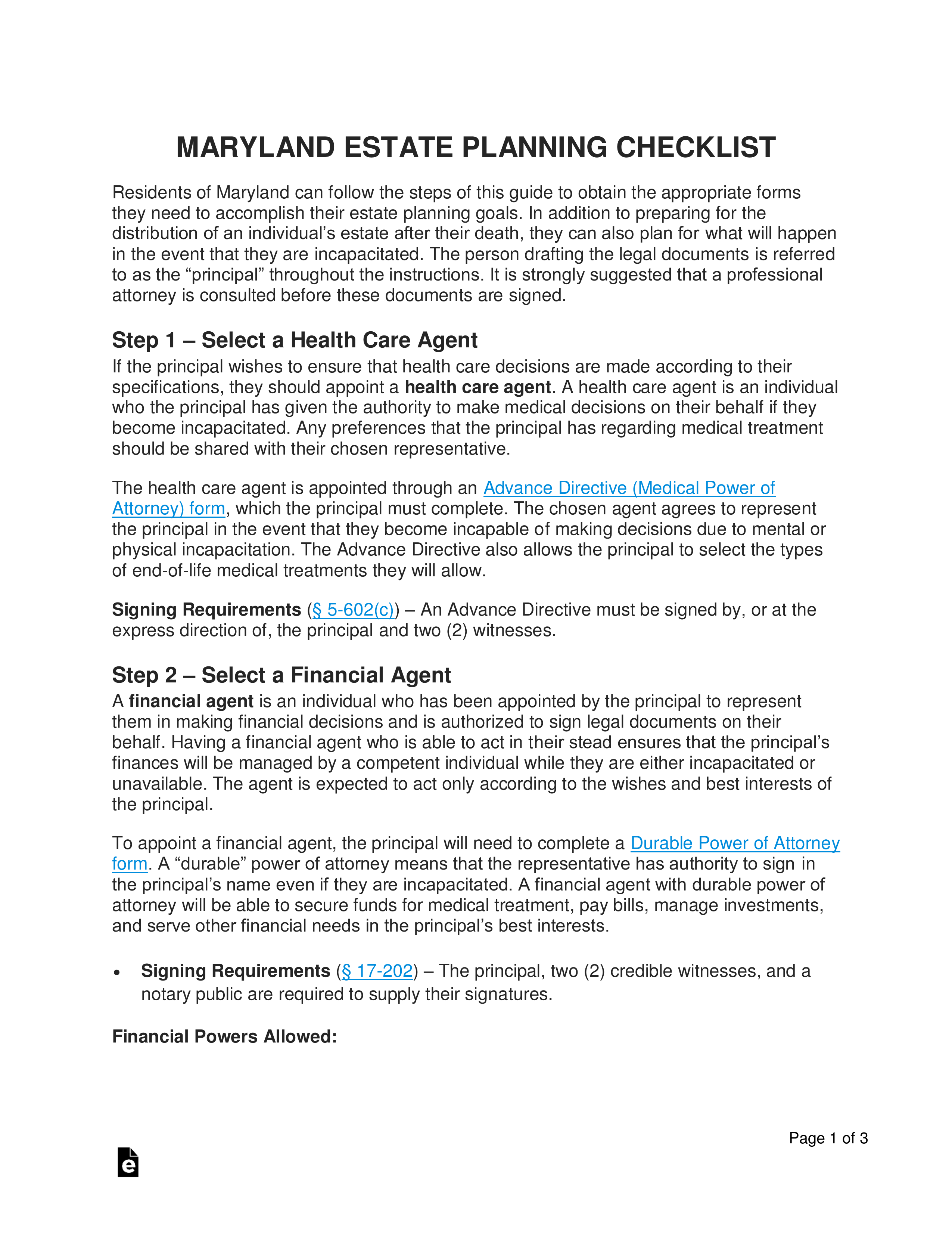Updated March 05, 2024
A Maryland estate planning checklist is a list of tasks and documents to complete when planning for end-of-life medical treatments, financial management, and the distribution of estates. There are multiple legal documents that must be completed to ensure that decisions are made according to an individual’s wishes and best interests when they are unable to do so themselves due to incapacitation. The Advance Directive (Medical Power of Attorney) and Durable Power of Attorney forms appoint one (1) or more individuals to represent an individual if they are incapacitated. After an individual dies they will need to have made a Last Will and Testament or Living Trust in order for their estate to be distributed in accordance with their wishes.
How to Create an Estate Plan in Maryland (6 steps)
- Select a Health Care Agent
- Select a Financial Agent
- Make a List of All Estate Items
- Designate Beneficiaries and Other Roles
- Execute Estate Transfer Documents
- Keep the Documents Safe
Residents of Maryland can follow the steps of this guide to obtain the appropriate forms they need to accomplish their estate planning goals. In addition to preparing for the distribution of an individual’s estate after their death, they can also plan for what will happen in the event that they are incapacitated. The person drafting the legal documents is referred to as the “principal” throughout the instructions. It is strongly suggested that a professional attorney is consulted before these documents are signed.
1. Select a Health Care Agent
If the principal wishes to ensure that health care decisions are made according to their specifications, they should appoint a health care agent. A health care agent is an individual who the principal has given the authority to make medical decisions on their behalf if they become incapacitated. Any preferences that the principal has regarding medical treatment should be shared with their chosen representative.
The health care agent is appointed through an Advance Directive (Medical Power of Attorney) form, which the principal must complete. The chosen agent agrees to represent the principal in the event that they become incapable of making decisions due to mental or physical incapacitation. The Advance Directive also allows the principal to select the types of end-of-life medical treatments they will allow.
Signing Requirements – An Advance Directive must be signed by, or at the express direction of, the principal and two (2) witnesses.[1]
2. Select a Financial Agent
A financial agent is an individual who has been appointed by the principal to represent them in making financial decisions and is authorized to sign legal documents on their behalf. Having a financial agent who is able to act in their stead ensures that the principal’s finances will be managed by a competent individual while they are either incapacitated or unavailable. The agent is expected to act only according to the wishes and best interests of the principal.
To appoint a financial agent, the principal will need to complete a Durable Power of Attorney form. A “durable” power of attorney means that the representative has authority to sign in the principal’s name even if they are incapacitated. A financial agent with durable power of attorney will be able to secure funds for medical treatment, pay bills, manage investments, and serve other financial needs in the principal’s best interests.
- Signing Requirements – The principal, two (2) credible witnesses, and a notary public are required to supply their signatures.[2]
Financial Powers Allowed:
- Demand, buy, sell, convey, lease, receive, accept as a gift or as security for an extension of credit, or otherwise acquire or reject an interest in real property or a right incident to real property.
- Pledge or mortgage an interest in real property or right incident to real property as security to borrow money or pay, renew, or extend the time of payment of a debt of the principal or a debt guaranteed by the principal, including a reverse mortgage; release, assign, satisfy, or enforce by litigation or otherwise a mortgage, deed of trust, conditional sale contract, encumbrance, lien, or other claim to real property that exists or is asserted.
- Buy, sell, and exchange stocks and bonds; establish, continue, modify, or terminate an account with respect to stocks and bonds; pledge stocks and bond as security to borrow, pay, renew, or extend the time of payment of a debt of the principal;
- Receive certificates and other evidence of ownership with respect to stocks and bonds; exercise voting rights with respect to stocks and bonds in person or by proxy.
- Enter into voting trusts, and consent to limitations on the right to vote.
- Continue, modify, transact all business in connection with, and terminate an account or other banking arrangement made by or on behalf of the principal; establish, modify, transact all business in connection with, and terminate an account or other banking arrangement with a bank, trust company, savings and loan association, credit union, thrift company, brokerage firm, or other financial institution selected by the agent
- Borrow money and pledge as security personal property of the principal necessary to borrow money or pay, renew, or extend the time of payment of a debt of the principal or a debt guaranteed by the principal.
- Continue, pay the premium or make a contribution on, modify, exchange, rescind, release, or terminate a contract procured by or on behalf of the principal that insures or provides an annuity to either the principal or another person.
- Assert and maintain before a court or administrative agency a claim, claim for relief, cause of action, counterclaim, offset, recoupment, or defense, including an action to recover property or other thing of value, recover damages sustained by the principal, eliminate or modify tax liability, or seek an injunction, specific performance, or other relief.
- To prepare, sign, and file federal, state, local, and foreign income, gift, payroll, property, federal insurance contributions act, and other tax returns, claims for refunds, requests for extension of time, petitions regarding tax matters, and other tax-related documents.
3. Make a List of All Estate Items
4. Designate Beneficiaries and Other Roles
5. Execute Estate Transfer Documents
After deciding how they would like their estate to be divided amongst their beneficiaries, the principal will need to select the estate planning document they wish to employ. By executing a Will or Living Trust, the principal can ensure that their inheritors will benefit from their estate after the principal’s death.
Last Will and Testament – The most commonly used option for administrating an individual’s estate. It allows the principal (testator) to name their beneficiaries and order the division of their property.
- Signing Requirements – Must be signed by the testator (or by their direction and in their presence) and two (2) or more credible witnesses.[3]
Revocable Living Trust – Places the grantor’s property and assets into the ownership of a Trust, which the grantor can continue to benefit from. Unlike a Will, a Living Trust does not have to pass through probate court before being distributed. When the grantor dies, all their estate held by the Trust will be distributed by the named trustees.
- Signing Requirements – A Living Trust needs to be signed by the principal, one (1) or more witnesses, and a notary public.[4]
6. Keep the Documents Safe
Maryland Estate Planning Laws
- Advance Health Care Directive – Health Care Decisions Act, Part I – Advance Directives
- Durable Power of Attorney – § 17-202
- Last Will and Testament – Estates and Trust, Title 4 – Wills
- Living Trust (Revocable) –Estates and Trusts – Title 14, Subtitle 4


